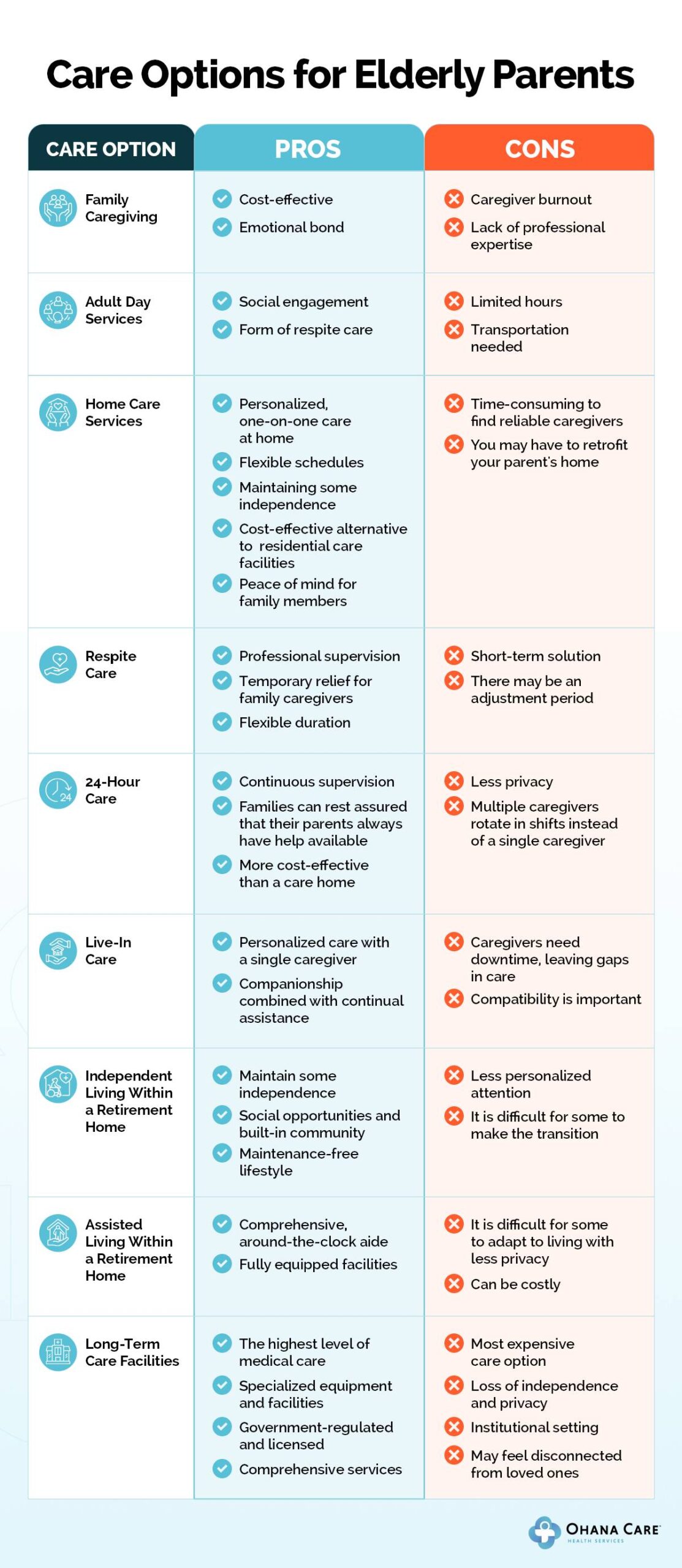Watching your parents age can be one of life’s most emotionally challenging experiences. The realization that the people who once cared for you now need more help than they used to can can bring up complex feelings that many adult children struggle to process.
When your aging parents begin to show signs they need help, whether it’s difficulty managing daily tasks or drastic changes in their health, it can feel overwhelming to navigate all the different care options available to them.
Regardless of your family’s situation, these are never easy realizations. You might find yourself asking questions like: “What community care services are available to Mom?” “Can we manage Dad’s care at home?” “What’s the difference between assisted living and home care services?”. These are all important considerations that affect the well-being of your aging parent, along with the peace of mind of your entire family.
The good news is that many care options exist for older adults, each designed to suit each individual’s unique health care needs, personal preferences, and financial situations. From family caregiving to in-home support and adult day services to retirement communities, understanding the pros and cons of each path can help you make the decision that works best for you and your aging parent.
Care Options for Elderly Parents
There are several factors that go into choosing the right care option for your aging parents. These factors include their current health status, level of independence, lifestyle preferences, family dynamics, doctor recommendations, and budget considerations. Here’s a breakdown of some of your options to help you make an informed decision.
Family Caregiving
Family caregiving involves trusted relatives accepting the primary responsibility for their aging family member’s care needs. This might include helping with household tasks, managing medications, providing transportation to medical appointments and social engagements, and offering companionship.
Many adult children find themselves gradually transitioning into this role as their parent’s needs increase over time.
Family caregiving can range from occasional check-ins and assistance with errands to full-time, hands-on personal care, depending on your parent’s level of independence.
There are lots of resources online to help you and your family make the transition to family caregiving as smooth as possible.
Pros:
- Cost-effective: This option does not require professional care fees, making it the most budget-friendly option for many families.
- Emotional bond: Family caregiving provides comfort and security through familiar relationships and strengthens personal connections with your aging parents.
Cons:
- Caregiver burnout: Family members often experience physical and emotional exhaustion due to more limited personal time and constant responsibilities.
- Lack of professional expertise: Family caregivers may not have the medical training needed to handle complex health issues or emergency situations, making this option more suitable for older adults who do not require professional help.
Adult Day Services
Adult day services provide supervised care and social activities for seniors during daytime hours. These programs often include meals, recreational activities, and basic health monitoring.
Most adult day programs cater to seniors who can benefit from structured activities and social interaction but don’t require overnight care. Some specialized programs also offer services for individuals with dementia or other specific health conditions.
Pros:
- Social engagement: Adult day services give seniors the opportunity to interact with peers and participate in group activities, which in turn can help reduce isolation.
- Can be a form of respite care: This option provides family caregivers with a break from their responsibilities so that they can work or continue with their own daily activities while ensuring their aging parent continues to receive the support they need throughout the day. This is why some families may choose to combine adult day services with family caregiving to create their ideal care plan.
Cons:
- Limited hours: Day services are typically available only during business hours, requiring other care arrangements for evenings and weekends. Therefore, this option may not be ideal for older adults without a family caregiver who are in need of constant care.
- Transportation needed: Families must arrange reliable transportation services to and from the facility.
Home Care Services
Home care services bring a professional Health Care Aide or a Licensed Practical Nurse directly to your parent’s residence to provide personal care, companionship, and assistance with daily living activities.
These services can include help with bathing, dressing, medication management, meal preparation, and other household tasks. Home care can be arranged for just a few hours per week or more intensive daily support, making it an adaptable option for those with changing needs.
Pros:
- Personalized, one-on-one care at home: These services allow your parents to receive individualized attention in their familiar environment.
- Flexible schedules: Home care can often be arranged for just a few hours per week or more intensive daily support, making it adaptable as circumstances change.
- Maintaining some independence: Aging adults can continue to live independently in their own homes while receiving professional support.
- Can be a cost-effective alternative: Home care services are often more affordable than residential care facilities while providing professional support.
- Peace of mind for family members: Professional caregivers provide expert care when family members cannot be present, allowing you the peace of mind of knowing your parent is in good hands.
Cons:
- Finding reliable, quality caregivers: It can be time-consuming to vet and select trustworthy professionals who have your parent’s best interests at heart.
- You may have to retrofit your parent’s home: Depending on your parent’s health, they may require ramps, grab bars, or chairlifts for safety and accessibility. In contrast, a senior living facility would already be equipped with these features.
Respite Care
Respite care, a type of home care, provides temporary relief for family caregivers by having professional caregivers step in for short periods, ranging from a few hours to several days.
This type of care is designed to give primary caregivers a break while ensuring their aging parents continue to receive quality support and supervision.
Pros:
- Temporary relief for family caregivers: This option allows primary caregivers to rest, attend to personal matters, or take vacations while maintaining the peace of mind that their parent is still receiving the support they need.
- Flexible duration: Respite care can be arranged for specific timeframes based on your family’s needs.
Cons:
- Short-term solution: This option is not intended as a permanent care arrangement.
- There may be an adjustment period: Your parent may need time to adapt to their new caregiver and temporary care routine.
24-Hour Care
24-hour care is another type of home care that provides continuous professional supervision through rotating shifts of caregivers who stay in your parent’s home around the clock. The caregiving team works in shifts to ensure someone is always present while allowing each caregiver adequate rest between shifts.
These caregivers can help with household tasks like making meals, paying bills, and managing medication. How these options differ is that 24-hour care is typically recommended for seniors who require constant monitoring due to safety concerns, medical conditions, or cognitive impairment.
Pros:
- Continuous supervision: 24-hour care ensures constant monitoring and immediate assistance when needed.
- Peace of mind: Families can rest assured that their parents are never alone and always have help available.
- More cost-effective than a care home: This option is often less expensive than residential care facilities while providing similar levels of supervision
Cons:
- Less privacy: The constant presence of caregivers can feel intrusive for some seniors who value their privacy.
- Multiple caregivers will rotate in shifts: Instead of a single caregiver, your parent will interact with several different care professionals throughout the day.
Live-In Care
Live-in care involves a single caregiver residing in your parent’s home to provide ongoing assistance and companionship. The caregiver typically has their own room and becomes part of the household routine.
This arrangement works well for seniors who prefer consistency and wish to develop a close working relationship with one primary caregiver rather than adjusting to multiple staff members.
Pros:
- Personalized care in the comfort of home: This option combines the familiarity of home with dedicated professional support from a single caregiver.
- Companionship combined with continual assistance: Having a live-in care aide provides your parent with both emotional support and practical help throughout the day.
Cons:
- Caregivers need downtime: Caregivers need time for sleep, breaks, and days off which may leave short gaps in care.
- Compatibility matters: The relationship between your parent and live-in caregiver is crucial for the success of the care services.
Independent Living Within a Retirement Home
Independent living communities offer private apartments or homes designed for seniors who are able to manage most of their daily activities by themselves but wish to have access to social opportunities and other services.
These communities typically provide resources and amenities like fitness centres, dining options, transportation services, and organized activities while allowing residents to maintain their autonomy, which many older adults appreciate.
Pros:
- Maintaining independence: Seniors can live autonomously while still having access to support when needed.
- Social opportunities: Living in a retirement home means having access to a built-in community filled with clubs and events that provide seniors with opportunities for new friendships and group activities.
- Maintenance-free lifestyle: In many cases, choosing a retirement home means you won’t need to worry about home repairs, yard work, or household maintenance, as these are often covered by residence fees.
Cons:
- Less personalized attention: Independent living services are often more general rather than tailored to individual needs.
- It can be difficult for some seniors to transition: Adapting to an independent living facility may be challenging due to unfamiliarity with the new environment.
- Can be expensive: While this option is generally less expensive than assisted living within a retirement home, some retirement homes can be costly. Depending on your financial situation, this may or may not be the ideal care option if it is not necessary.
Assisted Living Within a Retirement Home
Assisted living provides more comprehensive support than independent living, including constant support with personal care, medication management, and daily activities while maintaining some level of independence.
Care home residents with assisted living will typically live in private or semi-private apartments and receive an individualized care plan based on their personal needs.
Pros:
- Comprehensive, around-the-clock aide available: This option provides a happy medium between independent living and full nursing home care, making it a good option for seniors who may need regular assistance but don’t necessarily require intensive medical supervision.
- Fully equipped facilities: With assisted living, seniors have constant access to medical staff, emergency response systems, and specialized equipment
Cons:
- It can be difficult for some seniors to adapt: Choosing assisted living within a retirement home would most likely mean less privacy and a more structured environment for your aging parent, which can be a challenging transition for some.
- Can be costly: The monthly fees for assisted living can be substantial and may increase with time, or if your parent’s level of care increases.
Long-Term Care Facilities
Long-term care facilities, or nursing homes, provide intensive medical care and supervision for seniors with complex health conditions or significant physical limitations.
These facilities offer 24-hour nursing care, rehabilitation services, and assistance with all aspects of daily living. Long-term care is generally recommended for seniors who need constant medical monitoring, have multiple chronic conditions, or require a specialized care plan that cannot be safely provided at home or in assisted living.
Pros:
- The highest level of medical care: These facilities will provide your parent with access to a skilled nursing staff, doctors, and medical specialists around the clock. This option may also offer additional services like rehabilitation therapy, social activities, and nutritional support.
- Specialized equipment and facilities: Long-term care homes are often fully equipped to handle complex medical needs, mobility challenges, and emergencies.
- Regulated and licensed: Long-term care facilities must meet strict government standards for care quality and safety.
Cons:
- The most expensive care option: Monthly costs are typically higher than those of other care options and may not be fully covered by private insurance.
- Loss of independence and privacy: Long-term care homes typically function in a highly structured environment, which can give residents less control over daily routines.

Making the Right Choice for Your Family
Choosing care options for elderly parents can be one of the most challenging decisions families face, and having that initial conversation with your aging parents about their changing needs can feel even more daunting.
A lot of seniors deeply value their independence and may resist discussions about the potential of receiving support. This means it’s very important to approach these conversations with patience, respect, and understanding for your parent.
While this conversation will likely be challenging for you, it can be equally difficult for your parent to come to terms with their changing circumstances.
Don’t forget that you don’t have to navigate this journey alone or make every decision at once. Many families start with minimal support and gradually increase care services as needs change over time.
The goal isn’t necessarily to find the perfect solution but to find the right solution for your family’s unique situation. With careful consideration and open communication, you can help ensure your aging parents receive the care they deserve while maintaining their dignity and quality of life.
Receive Expert Guidance While Planning Your Parent’s Home Care Journey
If you have determined that aging in place is the optimal solution for your aging parent, numerous support options exist to ensure safe and comfortable home living. Home-based care allows seniors to maintain their independence while receiving the health care and personal assistance they need.
At Ohana Care, we specialize in helping families navigate these decisions and providing support for seniors who wish to age in place. Our team of qualified Health Care Aides and Licensed Practical Nurses can provide a wide range of services, from companion care and dementia support to respite and 24-hour care.
We understand that every family’s situation is unique, which is why we offer complimentary in-home consultations to assess your parent’s specific needs. We are dedicated to creating a flexible and fully customizable care plan for each senior we serve so that you can have peace of mind that your parents are receiving the best support possible.
Do you or your loved one need home care support? Join the 3,000+ clients who trust Ohana Care.
Fill out a contact form- Calgary:403-300-2273
- Edmonton:780-909-6151
- Vancouver:604-449-2200
- Vancouver Island:250-980-0598
Whether you’re looking for a few hours of support each week or around-the-clock care, we serve families throughout Calgary, Edmonton, Vancouver, Vancouver Island, and other locations in Western Canada.
If you’d like to learn more about how we can help your aging parents remain safely and comfortably in their own home, contact us today to schedule your complimentary consultation. We’re here to provide you with all of the resources and information your family may need when trying to navigate this important transition.





